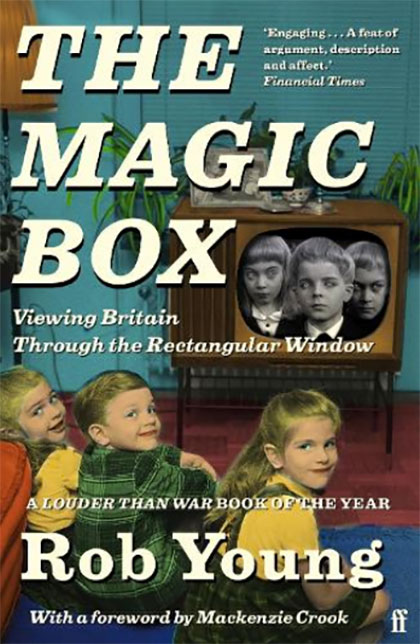
The Magic Box: Viewing Britain Through the Rectangular Window, Rob Young
(500pp, £12.99, Faber)
Rob Young’s Electric Eden was a fascinating and wide-ranging exploration of electric folk music; his book on Can was good too, but I’m less convinced by The Magic Box, a look at the way TV depicted Britain over the years since colonizing the corner of our lounges. And films too, though of course they aren’t always part of the title’s magic box.
Young presses all the right buttons, mentions all the usual suspects along with some new obscurities, dips into folk horror and hauntology, and succinctly and intelligently groups material together by theme, but it feels like he is late to the party. He may write about it much better than most – with the exception of Mark Fisher on hauntology – but there is no real argument here, and far too much summary rather than critical analysis.
After an intriguing first chapter, which takes in Village of the Damned, Doctor Who, World in Action and Billy Liar, we get three chapters dealing with English Dystopia. The first deals with the work of Nigel Kneale, including some of his more obscure work alongside Quatermass, the second considers some wider-focussed critiques of England, the third the very real responses to alien invasion and the Cold War, the unknown other, gathering up the likes of Threads and The War Game, alongside Day of the Triffids and Edge of Darkness.
Then it’s a bumper set of four chapters on Folk Horror, which sweeps its way from The Hound of the Baskervilles and Dead of Night to The Owl Service and The Wicker Man, via some Hammer Horror, cult classic Witchfinder General and A Field in England‘s more recent psychedelic version of the Civil War. ‘Cathode Wraiths’ (geddit?) comes next, a somewhat thinner selection of ghost stories along with an exploration of the concept of how buildings might contain (psychic?) traces of their previous inhabitants.
Then we are off to look through ‘The Vintage Lens’, firstly at some children’s programmes and films such as Bagpuss and Mary Poppins, then some reinterpretations of the past, be that King Arthur or Charles Dickens. Chapter 14 is one of the best in the book, gathering together a wide range of material set in country houses, including The Draughtsman’s Contract and Sir Henry at Rawlinson End amongst more obvious country house dramas such as Brideshead, Jane Eyre and Downton Abbey.
‘The Geography of Peace’ rounds up the likes of Fred Dibnah, John Betjeman, Chris Petit and Patrick Keiller, each dealing with place[s] in their own way, and also celebrates the work of British Transport Films. The next chapter is darker and more elegaic as it considers disappearing and remembered traditions and customs, from the Padstow Obby Oss to the demise of the Cornish fishing industry which underpins Mark Jenkin’s marvellous film Bait.
The next section is more political as it juxtaposes the 2012 Olympics Opening Ceremony with work such as Derek Jarman’s Jubilee and The Stuart Hall Project, before moving on to the ‘Private Dysfunctions’ on show in Scum, Kes, The Wall and Lindsay Anderson’s satirical trilogy If…, O Lucky Man! and Britannia Hospital. Then after a brief digression about time-shifting dramas, including an attempted rehabilitation of the appalling Sapphire and Steel, it’s time for ‘The Weird Old Albion’ and a closing chapter on ‘English Magic’.
Here, Young traces, or invents, a lineage from A Canterbury Tale through the electrifying Penda’s Fen and its exploration of class, music, mythology and sexuality, and Robin of Sherwood to Detectorists and Worzel Gummidge. It’s an upbeat and celebratory chapter, but also one that highlights the loose groupings of Young’s subject matter : ‘English Magic’ could just as well have included The Stone Tape, the BFI’s Obby Oss and Barley Mow films, The Owl Service and Children of the Stones.
If this review feels like a list, it’s because the book often reads as such. If my review comes across as totally negative, then I’m sorry, it’s not meant to be. Young has produced an enjoyable summary of and revisit to this material, but anyone who has been reading about nostalgia, folk horror, hauntology, film/TV history, even literature and sociology, will already have clocked most of this. If only Young had written The Magic Box a few years back it would be a totally different story, and a totally different review.
Rupert Loydell

Thanks for the review, the this has been on my ‘to read’ list for a while. I’ll probably still buy it, but it sounds like territory well trodden already by Scarred for Life volumes 1 and 2 and/or Wyrd Harvest Press’ Folk Horror Revival Urban Weird books.
Comment by Karlostheunhappy on 1 October, 2022 at 12:04 pm